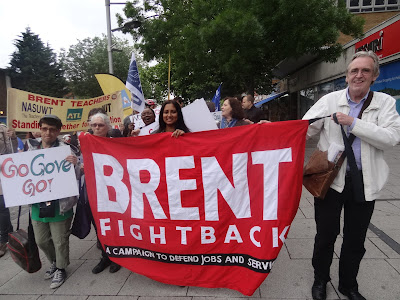Guestblog from Neonymph
Last week staff at Copland received a message
from the proposed new Head saying that she, with a group of students and
staff, ‘together’ had chosen the new
school’s name. (This did seem a little premature to some as Mr Gove has
apparently not yet signed the Funding Agreement for the school). Still, it was refreshing to see that, in
choosing a new name, Ark had put its
bad old sham ‘consultation’ days behind it and had involved all the
stakeholders in the decision-making process. And the extent of that culture-change
should not be underestimated. Only a few weeks have passed since Ark’s
control-freak nature was revealed in its decision to entrust the running of the
new school only to a current employee of Ark working alongside another current
employee of Ark who is a product of Ark’s own
Future Leaders processing
system.
So letting the staff and students choose the new school name without any
guidance from Ark signals a sea-change comparable to McDonalds suddenly
allowing its employees to ignore all they were taught at Burger Academy and to
start flipping their patties any old way they fancy. (And if any cynics out there are still sceptical
about how democratically the chosen name was arrived at, the words ‘students
and staff’ are employed 4 times in the message, along with ‘unanimous’, ‘we’
and ‘together’ in order to set their minds at rest). There’s
hope for the future too in the aspirational nature of the name Ark have
selected. For Sir Arthur Elvin was a man who came from nothing, came to Wembley
as an outsider, built up the old Twin Towers stadium, gave jobs to the
unemployed, allowed the community to use the athletics, swimming and
ice-skating facilities of the Wembley complex, got his hands dirty with his
workers picking up litter after an afternoon event in the stadium in readiness
for an evening fixture, treated his employees in exemplary fashion and,
according to local historians, had their almost universal respect and affection. Anyone looking for an aspirational figure
would agree that there’s lots here for Ark’s managers, and particularly the
hedge fund fat cats, millionaire Tory party donors and Boris Johnson bankrollers who own it, to aspire to. (As well as the kids of
course).
And the names that didn’t make the cut?: well, The Bob Crow Ark was never really a
starter and the long list of names suggested
by Wembley Matters readers here
LINK
probably
wouldn’t have survived the democratic scrutiny of ‘students and staff’
either.
Next meeting
‘we’ decide on Ark’s new ‘Ark Elvin Academy’ logo ‘incorporating some inspirational features of Sir Elvin’s (sic)
life’. Any suggestions from Wembley Matters readers would be very welcome . I’m
sure that in their new inclusive, democratic and consultative mood, Ark would
be delighted to take them on board.
Meanwhile Hank Roberts of the ATL has written to Annabel Bates (Headteacher designate) about the way the decision was made:
Dear Ms Bates,
You have informed me, as a member of Copland staff, that you have decided on the name of the proposed ARK academy on our Copland Community school site, to be the 'ARK Elvin Academy'.
May I ask on what basis the committee of four staff and six students, that was set up to consider the new school's name, was selected? For example, did you ask for volunteers, was there any particular qualification, were they picked out of a hat?
Were the committee given one proposed name, a selection of names or did they put forward their own names for consideration?
I also ask, was the Headteacher Dr Richard Marshall and the senior leadership team consulted and if not, why not? Were the Interim Executive Board (IEB) who are the governing body*, consulted? I know that the staff were not consulted, or asked for suggestions or given any options to take part in what you call “an important step forward .. for our school”. But why not? And is your proposed school logo to be decided by the same select committee?
Is this the manner in which you intend to make important decisions affecting the whole school in the future? There has been no staff 'buy in' to this decision. Even when the name of a pet dog is being chosen, normally the whole family are involved.
I look forward to your response.
Yours sincerely
Hank Roberts
Joint Copland NUT Rep and ATL Brent Branch Secretary
* The IEB remains responsible for school decisions until the
funding agreement has been signed


















